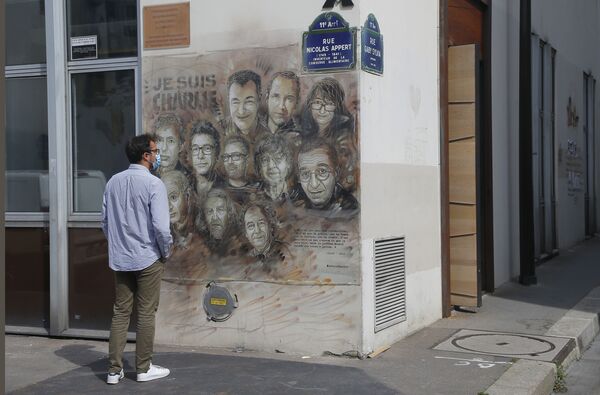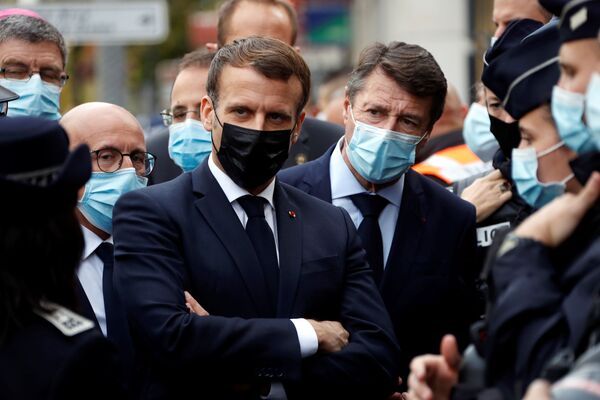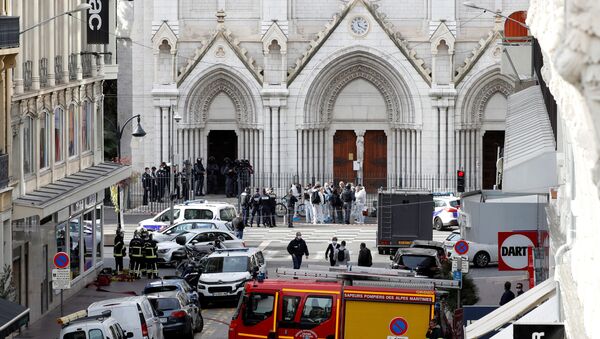The suspect behind Thursday's attack in Nice was said repeatedly to shout "Allahu Akbar", according to the city's Mayor, Christian Estrosi. French President Emmanuel Macron denounced the incident as an “Islamist terrorist attack” and vowed “the support of the whole nation to the Catholics of France and elsewhere”.
The deadly incident followed the beheading of French teacher Samuel Paty on 16 October by 18-year-old Abdoullakh Anzorov for showing Charlie Hebdo's cartoons of the Prophet Muhammad to his pupils - regarded as blasphemous by the Muslim community.
Terrorism Still Remains a Worldwide Issue
"The attack is unfortunately not unexpected", says Philip Ingram, a former British senior intelligence and security officer. "Radical groups have been using lockdown to continue their online recruiting and active encouragement of individuals to carry out lone wolf attacks. These are extremely difficult for the authorities to monitor and with less social interaction it is difficult for communities to spot people who may be acting out of charge and therefore to help the authorities identify threats before they become a reality".
Still, Nice’s local authority has taken the correct action and cleared the immediate area of the attack, acknowledges Dr David Lowe, a senior research fellow at Leeds Beckett University’s Law School and a retired police officer.
"Not just the Nice area but the whole of France will have to be vigilant as the trial of the 14 defendants who assisted in the 2015 Charlie Hebdo attack has been ongoing. Although it will have to be confirmed, this may be a motive for this attack", he suggests.
The satirical depiction of the Islamic prophet is believed to be one of the causes behind the 2015 deadly attack on the French magazine Charlie Hebdo. The bloodbath marked the beginning of a series of of jihadist attacks across France in 2015 which claimed the lives of more than 250 people. The trial of 14 suspects in the Charlie Hebdo massacre started in early September.
The situation in France, which is already tense because of severe COVID-19 restrictions, has been exacerbated by the attacks, Lowe notes, stressing that the police will have to identify locations where future attacks may be carried out and protect them.
He admits, however, that "knife and sharply bladed attacks are very easy to carry out and very difficult to prevent". Therefore, according to him, the police will need to be patrolling areas where people are likely to be, even with the COVID-19 restrictions.
"We've had a brief period of calm across the world on the terrorism front, probably caused by COVID-19 and the restrictions that has brought, with very few people in crowded places and lots of other worries to contend with", says Chris Phillips, the former head of the UK’s national counter-terrorism office.
Phillips warns that terrorism still remains a worldwide issue, and though at the moment France, through the Charlie Hebdo incident, is dealing with terrorism, it will be another country next: "I will say this won't be the last, there will be others, and most countries will suffer from terrorism at some stage over the next year, two years, five years until this problem, this issue, this dispute can be dealt with".

France's Secular Values & Migrant's Islamic Beliefs
Nice is a city deeply penetrated by Islamist ideas, argues Philippe Vardon, a municipal councillor for National Rally. He recollects that in 2007 Mayor Estrosi enthusiastically endorsed the construction of a large mosque in Nice.
"In the same year, during Ramadan, he visited the Al-Rahma Mosque, which is nothing more than the central mosque of the UOIF (Union of Islamic Organisations of France) in the Alpes-Maritimes department. On this occasion, he declared: 'I feel at home here'. And that's it", Vardon says.
The UOIF, also known as the Muslims of France, is an association allegedly connected with the Muslim Brotherhood*.
Tom Vandendriessche, a MEP from Flemish Interest Party has also subjected the city's leadership to sharp criticism: "Local authorities have abandoned certain neighbourhoods over the past years. They call it 'sensible zones'. Where the authority of the state retreats, radical Islam fills the vacuum. Police must be sent into these neighbourhoods immediately. Door-to-door checks must be made to find out who is living over there".
The problem is much broader given that France has welcomed hundreds of thousands of immigrants from predominantly Islamic North Africa and the Middle East over decades, allowing them to live in the country and supposedly assimilate, Chris Phillips says.
"But of course they are assimilating in a way that is not conducive to what French culture believes", he stresses. "That's a major rub, it's a problem for all countries, really. The UK, Germany, right across Europe, the US; all have very different belief systems than that of the extreme Islamic terrorist groups. So, that's going to be a rub for many generations to come, and we'll see and continue to see this".
The French authorities made an attempt to tackle the problem in early October, when President Macron presented his strategy to fight separatism focusing on Islam in particular and emphasising the necessity to "free Islam in France from foreign influences". After Paty's murder, Macron reiterated his pledge to "fight for freedom" while predominantly Muslim countries subjected the French President to criticism and called for boycotting French goods.

World Countries Need to Unite to Thwart Extremism
While observers continue to argue over the causes behind the recent attacks in France, the bloodbath has again exposed a shortfall in credible intelligence available to the French security services, says Peter Williams, a policing and terrorism expert at Liverpool John Moores University.
The most effective tool is to share intelligence including that support from other countries especially if background checks reveal the attacker has international links, according to Williams.
"Terrorism thrives when global actors work in isolation", agrees David Otto, the counter-terrorism director of Global Risk International (GRI) Ltd.
Efforts to counter the underlying terrorist ideologies and vulnerabilities within societies at risk are currently extremely disorganised and unco-ordinated both internally and externally and by civil and security multi-agencies, according to the international counter-terrorism specialist. He explains that this level of disunity has become "a huge loophole" which terrorists continue to exploit.
"Until the global community of people begin to hold each government to account for failure to co-ordinate their approach to counter-terrorism, the carnage we see in Nice and other countries will continue", argues Otto.
The emerging problem is exacerbated by the fact that over the recent years, the French government led by Sarkozy played a central "in the wicked policy of inciting, unleashing and arming thousands of Islamist terrorists in the Middle East", remarks Nick Griffin, former UK MEP and political commentator.
"If the latest horrors have finally brought home to Macron and other western leaders the gravity of the situation they helped to create, they would stop speaking about fighting a 'war on terror' while continuing to do all they can to help the Islamist terrorist gangs still operating in Syria", he says.
Andor Sandor, the former head of Czech military intelligence, shares a similar stance: the policies of western states aimed at destabilising the countries in the Middle East and Northern Africa, such as Syria, Iraq and Libya, are clearly linked with domestic terrorist attacks, according to him. As long as many Muslim countries remain destabilised and without strong governments, European states can hardly make any progress in thwarting Islamic extremism at home, he believes.
"World leaders must continue to unite against the scourge of these international brands of terror which don’t respect borders, they don’t respect our rules-based society and they don’t respect the very peaceful religion that Islam is in reality", underscores Philip Ingram. "It is only through international co-operation that the growth of terror around the globe can properly be countered. However, there is also a responsibility for social media, press, communities and more to ensure they don’t allow terrorist causes to be inadvertently emphasised".
*Muslim Brotherhood is a terrorist organisation banned in Russia.




